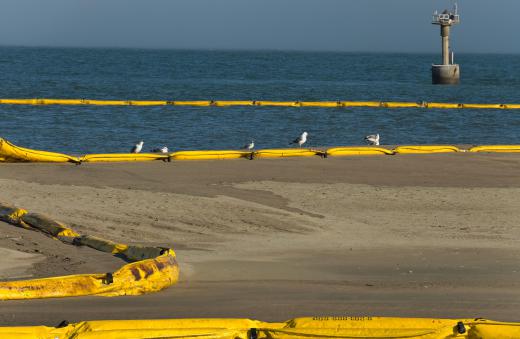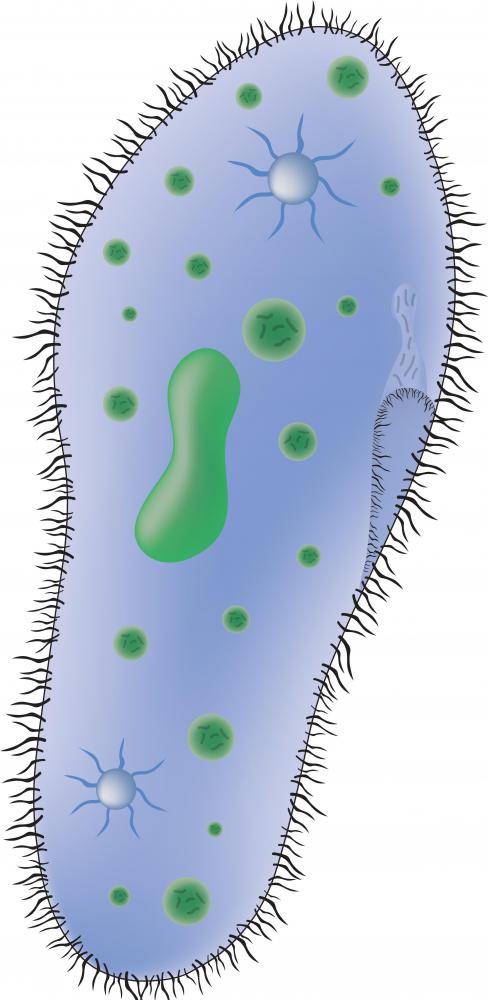What is Aquatic Ecology?
 Mary McMahon
Mary McMahon
Aquatic ecology is a branch of the science of ecology which is concerned with the study of aquatic ecosystems. This field can be broken into two divisions: freshwater ecology and marine ecology. Given that most of the Earth is covered in water, understanding aquatic ecosystems is very important, especially since water is critical to the survival of all life on Earth. Without water, Earth would be a very different place, and there probably wouldn't be any ecologists around to study it.
Freshwater ecology involves rivers, lakes, streams, seasonal bodies of water, underground water deposits, and the surrounding areas, while marine ecology is concerned with the ocean. Estuaries, where freshwater meets saltwater, may be studied by ecologists from either field, and sometimes both, working cooperatively on projects which require the expertise of freshwater and marine ecologists. Because water systems are interconnected, there is a great deal of cooperation between professionals working in various aspects of aquatic ecology, and between aquatic ecologists and other members of the ecology profession.

Whether an ecologist works with saltwater or freshwater, there are a number of topics of interest in aquatic ecology. Aquatic ecologists study natural populations of organisms in the water, learning about natural variations and the impact of influences like temperature, salinity, water depth, location, and season. Ecologists may be interested specifically in organisms of economic importance, or in the biology of an ecosystem as a whole.

Aquatic ecologists are also interested in human interactions with the environment, and the impact of human activity on aquatic ecosystems, ranging from oil spills in the ocean to agricultural runoff in lakes and streams. Some human activities have unintended consequences, and these consequences can take on an epic scale in the world of aquatic ecology, since all water eventually drains to the ocean, and the world's oceans are all connected. A microbe in the Ganges may end up in a harbor in Britain, and ecologists can explore the path that microbe took to get there, and whether or not human activities played a role.

There are a huge number of fields of study available to people working in aquatic ecology, including water conservation, environmental preservation, commercial uses of aquatic resources, pollution, the history of water use, water use policies, and the study of unique organisms in various aquatic environments all over the world. People typically enter this field by taking a degree in ecology, focusing on aquatic issues of interest, with some pursuing advanced training in graduate school to receive additional qualifications and experience.
AS FEATURED ON:
AS FEATURED ON:














Discussion Comments
Aquatic ecologist are becoming more and more important as we realize that many of the animals in fresh water make a good 'canary in the coalmine'. Frogs, in particular are quickly affected by pollution of almost any kind. Whereas algae blooms can be another indication that something isn't right.
Not to mention the need for ecologists to study the effect of fishing on the ocean at the moment. There have been quite a few recent examples of fish stocks being completely devastated because the fishers didn't take the ecology into account.
It's a troubling time for ecologists, but at least it is a busy one.
I studied a couple of ecology papers at university and estuaries are a particularly interesting ecology to consider.
Since they sometimes have a lot of salt, and sometimes have very little, any plants or animals that live there have to be adapted to both. That might not seem like a big deal, but it really is. Often sea creatures have complex systems in place to deal with salt water (so they can stay hydrated without poisoning themselves on salt) and if they are put into fresh water, they will die.
Adapting to fresh water means basically overhauling their whole circulatory system every time they change habitat.
When you consider that fish like salmon do this, it makes their spawning runs all the more impressive.
Post your comments